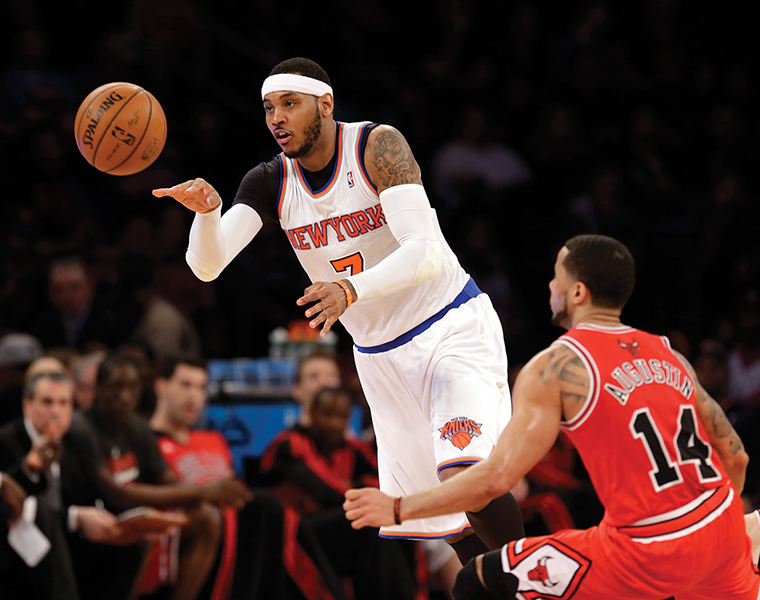Money may diminish athletes’ motivation
The New York Knicks’ small forward Carmelo Anthony played 77 games this season and averaged 27 points and 8 rebounds per game during the final year of his contract.
May 5, 2014
A recent study analyzing athletes’ motivation may change the way major league sports organizations negotiate player contracts.
The study, published Jan. 22 in Springer Science+Business Media, found that an athlete’s performance reaches its peak during his or her contract year—the year before a players’s contract is up.
For the study, Mark White, a senior psychological science major at the University of Missouri-Columbia, compiled and analyzed more than 230 NBA and Major League Baseball players’ sports statistics during their pre-contract year, the contract year and the post-contract year.
“Extrinsic motivators like money or an athletic contract can threaten physiological needs such as feeling [in control] or [being] confident,” White said. “It decreases our extrinsic motivators and decreases how much we enjoy [sports and] we perform worse.”
White said motivators like pay could inspire players during their contract year, which can lead to big bonuses. The problem, though, is that playing for money undermines how much an athlete will enjoy performing the following year because of the loss of these motivators.
White said the study suggests that instead of giving athletes intrinsic motivators, sports team managers should make players feel comfortable with the teams, and also feel as if they are making their own decisions so that they are more confident in their choices. How well athletes perform depends on their contracts. If athletes are motivated, they will perform better.
White said economists tend to focus on how much money athletes should make during their contract year but neglect the psychological impacts a contract year can haveon players.
Pete Temple, a clinical performance psychologist, said the study’s findings might imply that athletes play primarily for the contract money, but he said he thinks there are more complex factors at play.
“If you talk to athletes, they know they have tons of money, but it’s about respect,” Temple said. “I think athletes should be internally driven, but the research suggests that once they get their big deal, their intrinsic motivation goes away.”
Temple said fans expect athletes to always give 100 percent when competing, but the team owners are the ones who are underperforming.
“Coaches might say, ‘I’m perfectly happy with my athletes,’ but fans might say, ‘A player scored 15 points last year and now he’s only scoring 10,’” Temple said. “I think there are a lot of variables to be calculated before saying that athletes aren’t motivated.”
Monique Maye, assistant professor in Columbia’s Business & Entrepreneurship Department and owner of Barnes & Maye Marketing, said it is hard to motivate athletes without using money as an incentive, but from an agent’s perspective, the study makes sense.
“When athletes are performing well, their agent and their representation would have ammunition, so to speak,” Maye said. “Their agent would say their statistics are pretty high and the athlete is performing well because he’s a good performer and can perform at a high level for your team.”








